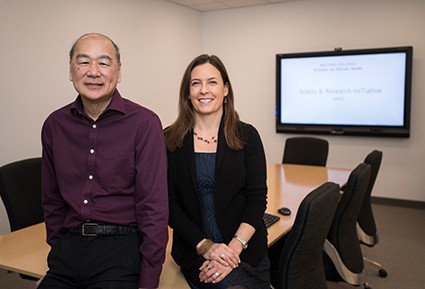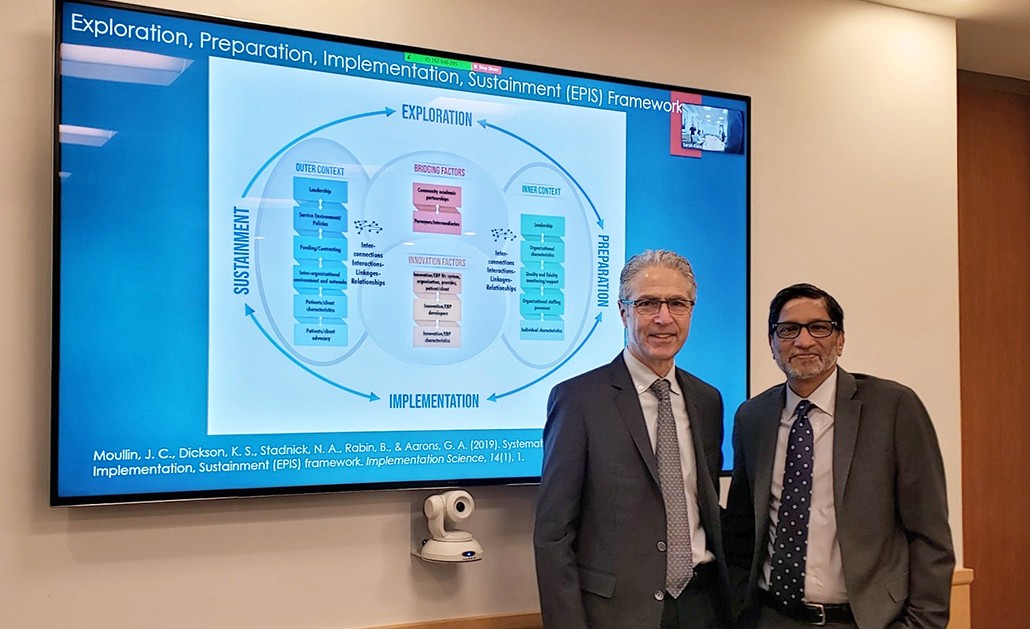Under the leadership of Boston College School of Social Work (BCSSW) Dean Gautam N. Yadama, BCSSW is intensifying its focus on interdisciplinary research methodologies—such as design thinking, systems science, and implementation science—to solve complex social problems. In keeping with that priority, Salem Professor in Global Practice Theresa Betancourt co-founded the GRIT series along with Associate Dean for Research and Dorothy Book Scholar David Takeuchi. GRIT brings together university professors, post-doctoral fellows, and student researchers with investigators from low- and middle-income country (LMIC) research partner sites linked to the National Institute of Mental Health (NIMH)-funded Collaborative Hubs for International Research on Mental Health, while also offering opportunities for BCSSW students and faculty to participate and interact.

GRIT co-founders David Takeuchi and Theresa Betancourt
“It is rewarding to be able to connect researchers around the world, introduce them to leading edge practices from experts such as Greg Aarons, and expand opportunities for them to shape effective mental health research initiatives,” explains Betancourt of the series she launched in March of 2018. “I am passionate about transitioning successful evidence-based practice to scale. Implementation science can help us to bridge the gap between our knowledge on interventions for promoting better mental health in populations facing adversity and the reality of what’s done on the ground in very low resource settings.”
Dr. Aarons’s research, funded by the National Institutes of Health (NIH), the Centers for Disease Control, and major foundations, identifies and improves system, organizational, and individual factors that support implementation and sustainment of evidence-based practices and quality of care in health and allied health care settings. The pioneering clinical and organizational psychologist shared his presentation, “Developing and Testing Implementation and Scale-Up Strategies to Improve Health,” with BCSSW researchers and collaborators from diverse disciplines in developing countries.
Aarons began his GRIT presentation by stressing the importance of selecting organizing frameworks for health interventions based on theory as well as an in-depth understanding of on-the-ground context. He then outlined specific implementation tools he employs, including:
- The four-phased Exploration, Preparation, Implementation, Sustainment (EPIS) framework currently used in 11 countries, including in the NIMH-funded Scale-Up Hub Youth Forward project in Sierra Leone and Liberia that Betancourt leads.
- The Leadership and Organization Change for Implementation (LOCI) data-driven organizational climate-building multilevel strategy that is being tested and used in mental health, education, child welfare, HIV prevention, and trauma care settings in the United States, Norway, and West Africa.
- The Interagency Collaborative Teams (ICT) model used to build capacity and scale up evidence-based interventions in the United States and West Africa.

Dr. Gregory Aarons and Dean Gautam N. Yadama at the GRIT seminar
To demonstrate the pivotal role of implementation science methodology, Dr. Aarons highlighted the use of EPIS and ICT to shape, launch, and continually monitor an in-home parenting program called SafeCare®, designed for families with children from birth to five years old in San Diego County, California, who are at high risk for abuse and neglect. He underscored the importance of building capacity in alternate delivery platforms when adapting models for use in other geographies. Dr. Aarons illustrated this concept, explaining how the interagency collaborative team implementation strategy used in the scale-up of the California-based SafeCare® intervention was modified and deployed to serve war-affected youth in Sierra Leone, leveraging youth employment resources given that the mental health resources tapped in California do not exist in this African country.
“The important role of implementation science is to ensure that all the work focused on intervention development results in excellent patient care in communities,” explains Aarons. He also extolled the merits of reciprocity in interdisciplinary team science. “It is not only critical for researchers to take learning and programs developed domestically and to appropriately scale them in low- and middle-income countries but also to bring engagement and collaboration best practices back from developing countries to developed countries.”
Dr. Aarons presented to a full house in the smart conference room in McGuinn Hall at Boston College with participants from several countries attending via videoconferencing software. GRIT events are also recorded to allow RPCA participants in different time zones and low-resource settings to access them at a later date, often at an event hosted by a local faculty member. Please e-mail to learn more about participating in future GRIT seminars.
The Relevance of Implementation Science to Population Health Interventions
According to the National Institutes of Health, implementation science is the study of methods to promote the adoption and integration of evidence-based practices, interventions, and policies into routine health care and public health settings. Implementation research plays an important role in identifying barriers to, and enablers of, effective global health programming and policymaking, and leveraging that knowledge to develop evidence-based innovations in effective delivery approaches.

